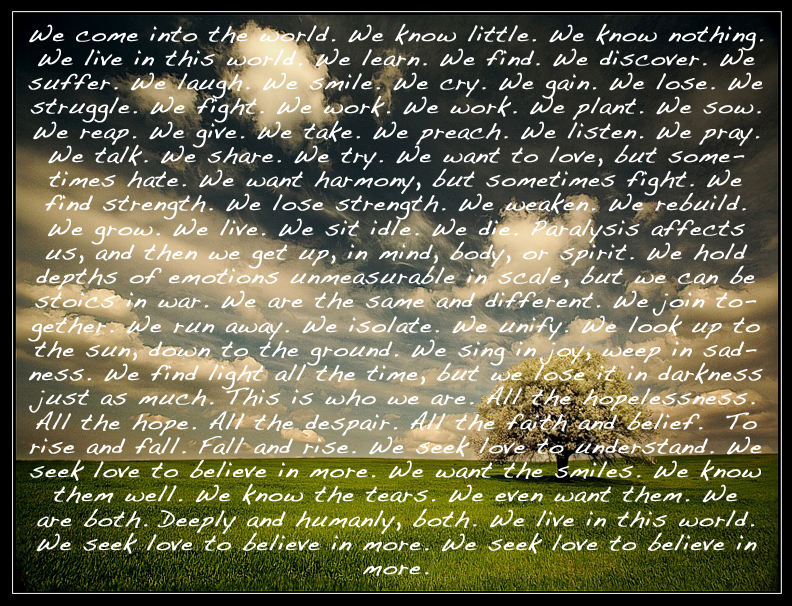by Michael Bailey | May 5, 2019 | Words Etc |
Introspection
From Wikipedia, the free encyclopedia
Introspection is the examination of one’s own conscious thoughts and feelings. In psychology, the process of introspection relies exclusively on observation of one’s mental state, while in a spiritual context it may refer to the examination of one’s soul. Introspection is closely related to human self-reflection and is contrasted with external observation.
Introspection generally provides a privileged access to one’s own mental states, not mediated by other sources of knowledge, so that individual experience of the mind is unique. Introspection can determine any number of mental states including: sensory, bodily, cognitive, emotional and so forth.
Introspection has been a subject of philosophical discussion for thousands of years. The philosopher Plato asked, “…why should we not calmly and patiently review our own thoughts, and thoroughly examine and see what these appearances in us really are?” While introspection is applicable to many facets of philosophical thought it is perhaps best known for its role in epistemology; in this context introspection is often compared with perception, reason, memory, and testimony as a source of knowledge.

by Michael Bailey | Mar 28, 2019 | Family, Life & Timing, Words Etc |
As I am apt to do, I think about big picture life in quiet moments. Especially when I am in a pleasant environment around nature. I thought about what I wanted life to be, wished it would be, hoped it was underneath all of the overlays of existence. Its overwhelming to digest. Most people don’t do it. At least not until they feel the sand in the hourglass running out. My father was like that in his later years. He would talk to me differently than he had when I was a boy. He would mention words of wonder about the world, the power of religion in positive ways for troubled souls.
Dad wasn’t religious, but he became religious, as in a devotion to the wholeness in which he started viewing the world. I knew what he was going through, but as a teenager troubled by my own growing pains, I didn’t appreciate it. He died soon after my eighteenth birthday, and that is precisely when I started to first open my eyes to what he was seeing, how he felt. I thought about him and about that time, when I wrote the words below on a sloping green hillside under the sun. <MB

Copyright © Michael Bailey | All Rights Reserved
by Michael Bailey | Dec 27, 2017 | Words Etc |
To live honestly, is to spend quiet time with ourselves doing nothing but thinking about life, and what we feel about it. Deeply, honestly,
I don’t mean some few random minutes of thumbnail introspection, whilst in the throes of passion, perhaps during a conflict or interaction about our strongest beliefs, followed by making a grand statement or two, spoken aloud, or to ourselves, as we putter around the house, doing laundry, or feeding house pets. Anybody can do that.
I mean really devoting specifically directed block of time, of thirty or more minutes, in quiet isolation, on a periodic basis, alone with ourselves, free of interruption and distraction, thinking about what we really feel deep inside about who we are, what we want, need, and believe to be most important to help us feel balanced with, and reasonably adjusted to, the complexities, and challenges of life.
It is most important that when spending this time alone to think about who we are, we do so with no pretense, or illusion, on realistic expectations, circumstances beyond our control, or a denial of who we are, innately, instinctively, without apology, guilt, conflict, or hesitancy.
For better or worse, given the benefit or consequences, to face all of this without fear, is the only way to live honestly within oneself. It will help us be who we really are, and it will allow us to live honestly with others.
It is the only way to live..
<MB

by Michael Bailey | Oct 23, 2017 | Words Etc |
I wonder if we could love passionately, if ecstasy would be possible at all, if we knew we’d never die.
—Abraham Maslow
“Where is wisdom we have lost in knowledge? Where is the knowledge we have lost in information?”
—T.S Eliot
The mind learns by doing. The heart learns by trying.
—Unknown
Take what you want, said God, and pay for it.
—Spanish Proverb
Sex without love leaves the body cold. Love without sex leaves the soul empty.
—Linda Goodman
Don’t judge a man by what he has. Judge a man by what he gives.
—Unknown
A man’s reach should exceed his grasp, otherwise what’s Heaven for?
—Robert Browning
Genius begins great works. Labor alone finishes them.
—Unknown
“What we are aiming at when we fall in love is a very strange paradox. The paradox consists of the fact, that when we fall in love, we are seeking to re-find all or some of the people who we were attached as children. On the other hand, we ask our beloved to correct all of the wrongs that these early parents or siblings inflicted upon us. Love contains in it the contradiction; the attempt to return to the past and the attempt to undo the past”
—From the film, Crimes and Misdemeanors
“Perhaps the most one can say is that the normal artist at his easel goes from his normality out to the edges of his personality and approaches madness. Meanwhile, the psychotic artist goes from his craziness out to the edges of his personality and approaches the normal. They come from different directions, but they meet in a no man’s land we call art.”
—Unknown
“To laugh often and much; to win the respect of intelligent people and the affection of children; to earn the appreciation of honest critics and endure the betrayal of false friends; to appreciate beauty; to find the best in others; to leave the world a bit better, whether by a healthy child, a garden patch or a redeemed social condition; to know even one life has breathed easier because you have lived. This is to have succeeded.”
—Emerson
“Science is the remedy to feeling at odds with employees over getting more work out of them.”
—Taylor
two shall be born…the whole wide world apart
and speak in different tongues…and have no thought
each, of the other’s being…and no heed
and these same two
o’er unknown seas, to unknown lands, shall cross
escaping wreck, defying death
and all unconsciously
shape each act, and bend each wandering step
to this one end…
that one day, out of darkness
they must meet
and read Life’s meaning in each other’s eyes
and these same two
along some narrow way of Life shall walk
so nearly side by side
that should one turn, ever so little space
to left…or right
their needs must be acknowledged, face to face
and yet…
with wistful eyes, that never meet
and groping hands that never clasp
with lips, calling in vain, to ears that never hear
they seek each other all their weary days
and die unsatisfied
…and this is Fate
—unknown
“Until a person can say deeply and honestly, “I am what am I am today because of the choices I made yesterday,” that person cannot say, “I choose otherwise.”
—Stephen R. Covey
“You have to be very careful if you don’t know where you’re going, because you might not get there.
—Yogi Berra
“When love and skill work together, expect a masterpiece.
—John Ruskin
“Love is but the discovery of ourselves in others, and the delight in the recognition.
—Alexander Smith
“The deepest hunger of the human soul is to be understood. The deepest hunger of the human body is for air. If you can listen to another person, in depth, until they feel understood, it’s the equivalent of giving them air.”
—Stephen R. Covey
“For one human being to love another: that is perhaps the most difficult of all our tasks, the ultimate, the last test and proof, the work for which all other work is but preparation.
—Rainer Maria Rilke
If you trap the moment before it’s ripe,
The tears of repentance
you’ll certainly wipe;
But if once you let the ripe moment go
You can never wipe off the tears of woe.
—William Blake 1791
“You fall out of your mother’s womb, you crawl across open country under fire, and drop into your grave.”
—Quentin Crisp
“Next to a circus there ain’t nothing that packs up and tears out faster than the Christmas spirit.
-Kin Hubbard
If you can find something everyone agrees on, it’s wrong.”
-Mo Udall
An idea isn’t responsible for the people who believe in it.
-Don Marquis
Democracy is a device that ensures we shall be governed no better than we deserve.
-George Bernard Shaw
A government that robs Peter to pay Paul can always depend upon the support of Paul.
-George Bernard Shaw
The trouble with our times is that the future is not what it used to be,
-Paul Valery
Human war has been the most successful of our cultural traditions.
-Robert Ardrey
Under certain circumstances, profanity provides a relief denied even to prayer.
-Mark Twain
Men have a much better time of it than women; for one thing they marry later; for another thing they die earlier
-H.L. Mencken
Lying is a way of taking personal responsibility for reality.
-Garrison Keillor
Conversation is the enemy of good wine and food.
-Alfred Hitchcock
Government is too big and important to be left to the politicians.
-Chester Bowles
Misogynist: A man who hates women as much as women hate one another.
-H.L. Mencken
If we were not all so interested in ourselves, life would be so uninteresting that none of us would be able to endure it.
-Schopenhauer
The trouble with the rat race is that even if you win, you’re still a rat.
-Lily Tomlin
Ours is a world where people don’t know what they want and are willing to go through hell to get it.
-Don Marquis
You can have what you want or what you need, but not both.
-Unknown
The cause of almost all relationship difficulties is rooted in conflicting or ambiguous expectations around roles and goals. Whether you are dealing with the question of who does what at work, how you communicate with your daughter when you tell her to clean her room. or who feeds the fish and takes out the garbage, you can be certain that unclear expectations will lead to misunderstanding, disappointment, and withdrawals of trust.
Communication is primarily a function of trust, not of technique. When the trust is high, communication is easy, it’s effortless. it’s instantaneous, and it’s effective-it works. But when the trust is low and the Emotional Bank Account is overdrawn, communication is exhausting, it’s terribly time-consuming, and it’s like walking around a minefield.
-Steven Covey
“Listening to your heart, finding out who you are, is not
simple. It takes time for the chatter to quiet down. In
the silence of “not doing” we begin to know what we feel.
If we listen and hear what is being offered, then anything
in life can be our guide…Listen.”
-Unknown
“I’m not who I was twenty years ago and I won’t be who I am now in the next twenty years.”
-FM2030 (From Optimism 1)
“Conventional names define a person by his past.”
-FM2030 (From Optimism 1)
“There’s far less mystery to human behavior than there are problems.”
-Anonymous
“House guests are like fish. After two days they start to smell.”
-Unknown
“If you want to sell something to everybody, make sure it has a big bust line.”
-Unknown Advertising Executive
“Life is a game. You’re either playing yours or you’re playing somebody else’s.”
– Michael Bailey
“If you want to know where the country is heading. Look at the Congressman.”
-Michael Bailey
“There’s no such state as formless. Some boundaries are further away, but they are always there.”
-Michael Bailey
“I like lesbians. They’re like really cool men.”
-Michael Bailey
“Problems cannot be solved by the same consciousness that created them”
-Albert Einstein
“Men are made both fools and heroes by women.”
-Michael Bailey
“Money is like sex. You think of nothing else if you don’t have it.”
-James Baldwin
“Be kind, because everyone you meet is fighting a hard battle.”
-Plato

by Michael Bailey | Jan 20, 2017 | Words Etc |
I’ve become a man of spells lately…
Dizzy spells
Hearing spells.
Headache spells
Vision spells.
Equilibrium spells
Orientation spells.
Loss of Memory spells
Spells of spells…
I think I know what it is, what they are. Or, I don’t know what it is. Somehow none of them really bother me…anymore.
>MB



